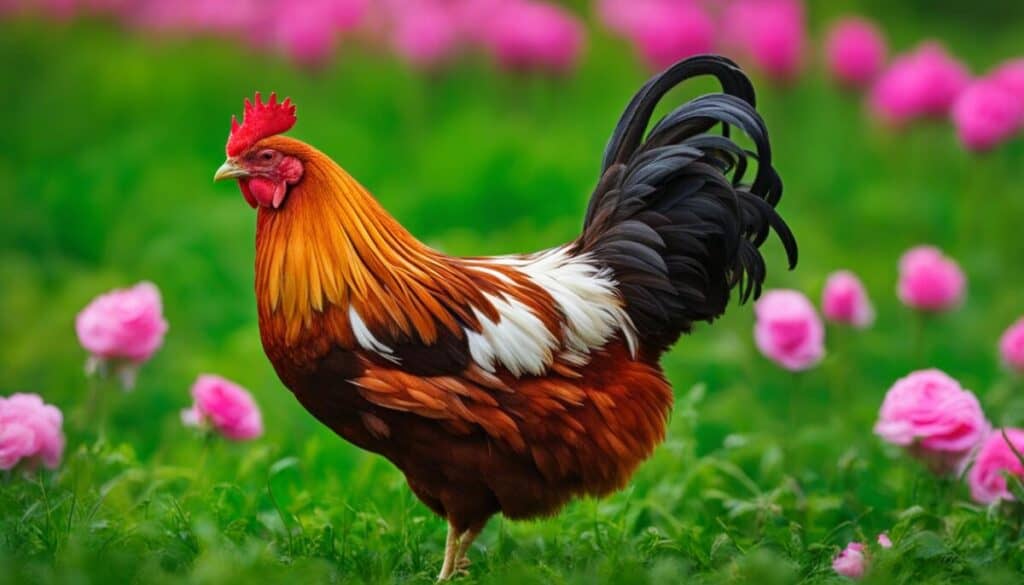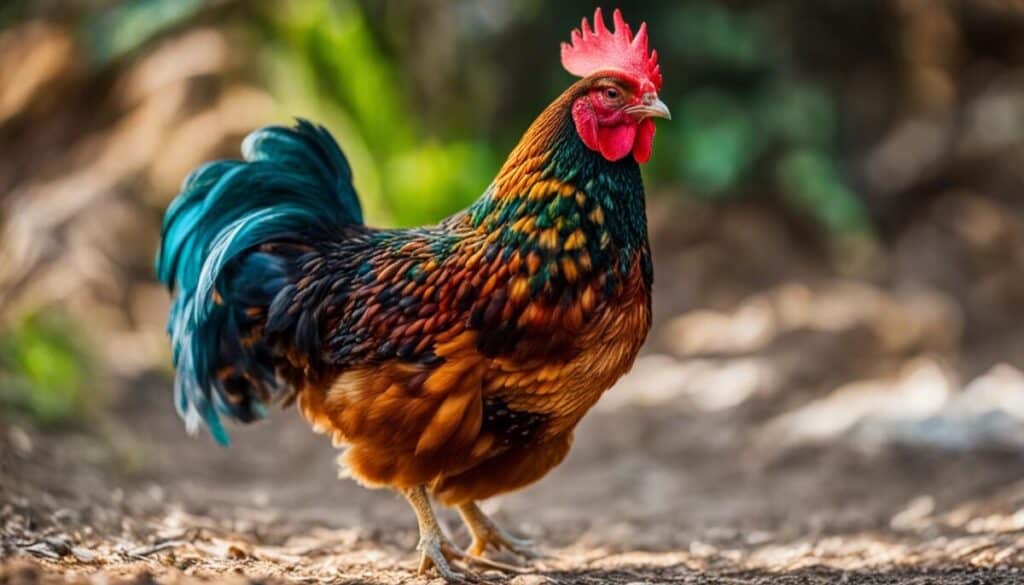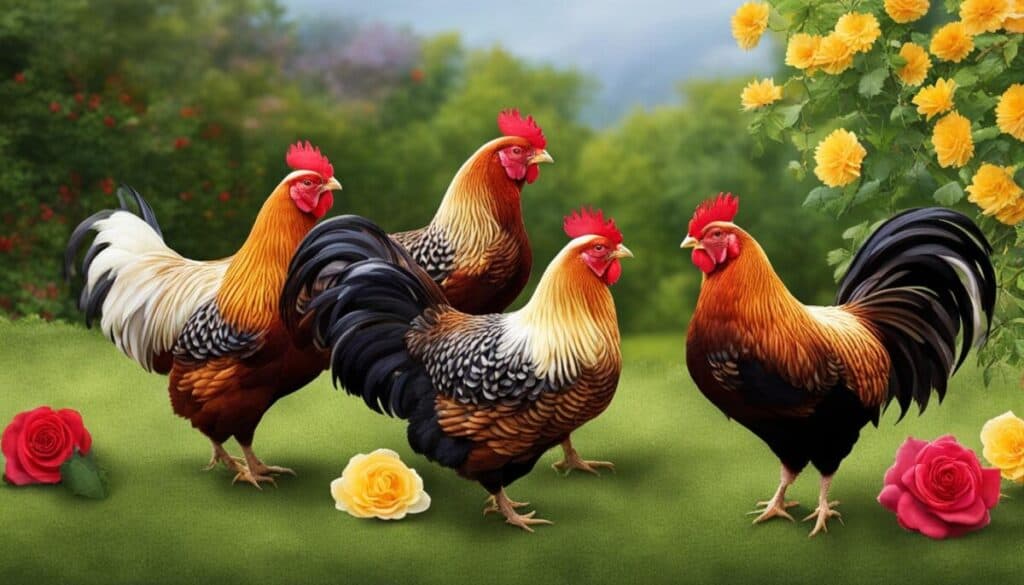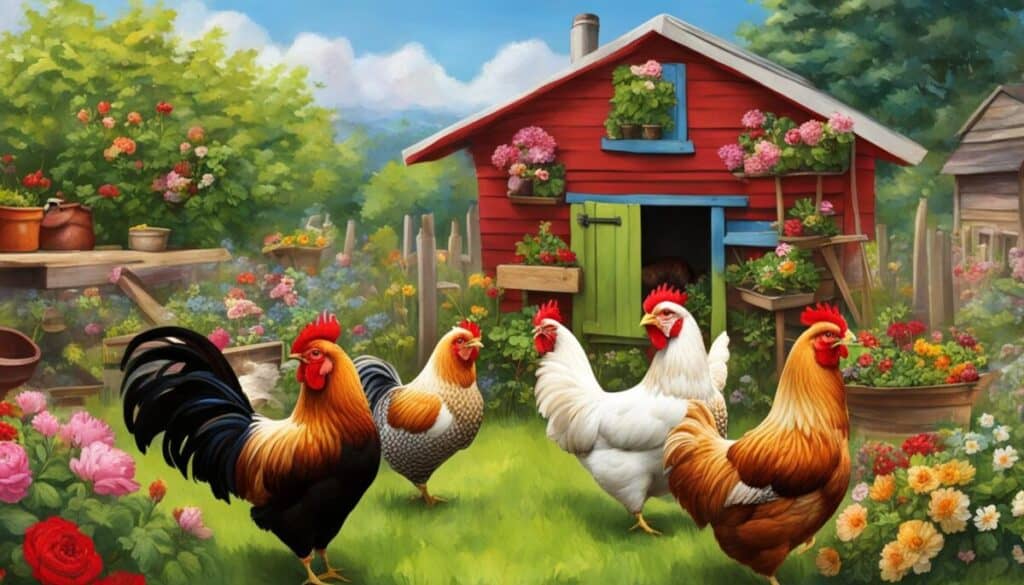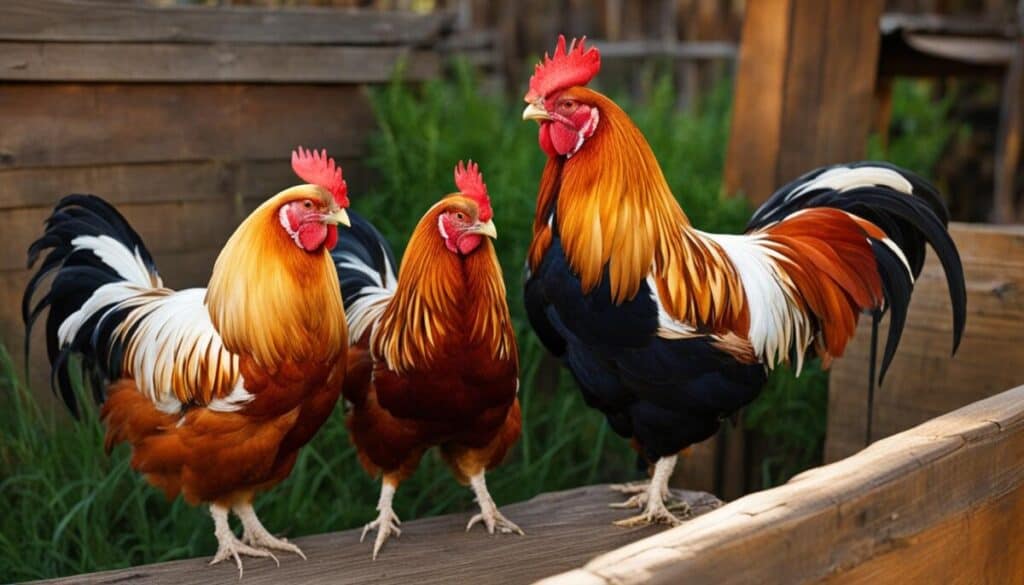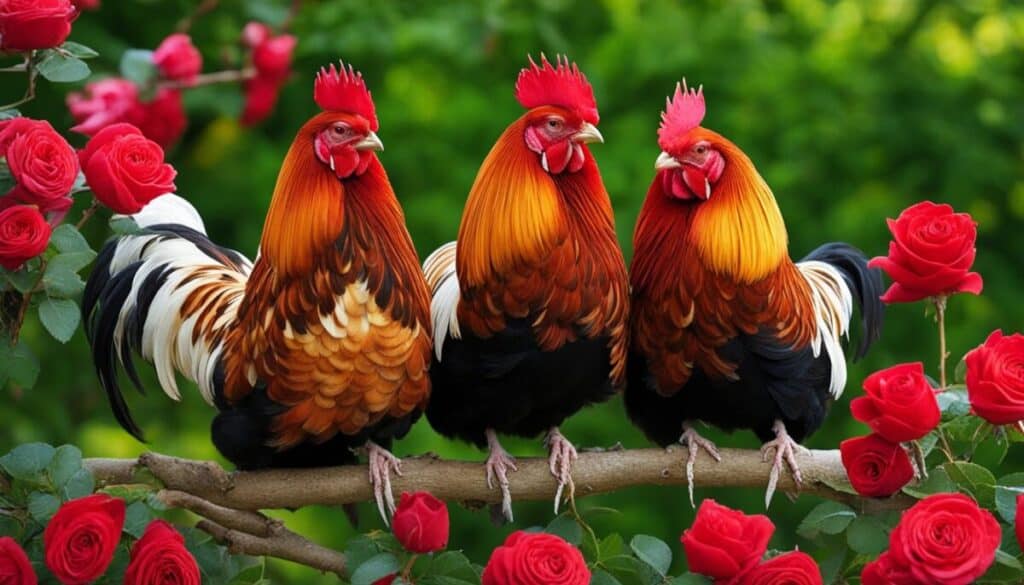Rosecomb chickens are one of the most delightful chicken breeds that you can find. They are small-sized ornamental chickens that originate from England, where they emerged in the 1830s. These show quality chickens are known for their rose-shaped comb and vibrant feather colors that make them ideal for exhibition poultry as well as backyard chickens for poultry enthusiasts.
If you’re searching for a rare breed chicken that is not only appealing but also holds great significance in preserving traditional poultry breeds, then you must consider raising Rosecomb chickens.
In this guide, we’re going to discuss everything you need to know about Rosecomb bantams, including their history, characteristics, breeding and raising them, caring for them, and much more.
Key Takeaways
- Rosecomb chickens are a rare chicken breed that originated in England in the 1830s.
- They are small-sized ornamental chickens that are highly popular among poultry enthusiasts for their unique characteristics and vibrant feather colors.
- Rosecomb chickens are suitable for both show quality exhibits and backyard settings.
- They are known for their rose-shaped comb and their significance in preserving traditional poultry breeds.
- If you’re interested in raising Rosecomb chickens, you need to learn about their breeding, raising, and general care to ensure their well-being.
History of Rosecomb Chickens
Rosecomb chickens, also known as Bantam Rosecombs, are a rare breed of small-sized chickens with an ornamental appearance that makes them popular amongst poultry enthusiasts. The breed’s exact origins are unknown, but it is believed to have originated in England, where it was first exhibited in the early 19th century, around 1815. The breed’s distinctive characteristic is its rose comb, which has a unique V-shape, unique to the breed.
Rosecomb chickens were breed as an ornamental bird, selectively breed for a show-quality look with beautiful feather markings and unique physical features. They have always attracted backyard enthusiast because of their small size, which makes them easy to raise and take care of. However, Rosecomb chickens are a rare breed, and maintaining their genetic purity is essential to preserve their heritage lineage for the next generations.
Due to their unique appearance and rare breed status, Rosecomb chickens are popular in exhibition poultry, making them highly sought after by poultry breeders worldwide. They are a valuable addition to the farming community and are becoming increasingly popular among the general public, especially those who enjoy raising backyard chickens.
Despite being a rare breed, Rosecomb chickens continue to thrive, largely due to the continuous efforts of preservationists to conserve this English heritage breed. Rosecomb chickens are an excellent example of how the preservation of traditional poultry breeds contributes to biodiversity. By conserving these breeds, we not only safeguard their genetic diversity but also help maintain a sustainable and healthy farming ecosystem.
Characteristics of Rosecomb Chickens
Rosecomb chickens are small-sized ornamental chickens that have unique features that make them an attractive addition to any backyard. These chickens have a petite frame, with cocks weighing 22-24 oz and hens weighing 20-22 oz. Despite their small size, Rosecombs have lively personalities and are confident, friendly birds.
One of the most distinctive features of Rosecomb chickens is their unique comb shape. The comb is upright, narrow at the base, and sharply tapers to a single point at the front. The striking appearance of the comb makes a bold and elegant statement, drawing attention to their ornamental value.
Rosecomb chickens come in a range of feather colors, including black, white, blue, and silver duckwing. Their feathers are hard, clean, and well-fitted to the body, giving a neat and well-proportioned appearance.
“The unique combination of their comb shape, small size, and varied colors makes Rosecombs one of the most striking ornamental chicken breeds available today.”
Rosecomb chickens are an excellent choice for exhibitors who want to showcase their poultry in poultry shows. They are a favorite among poultry enthusiasts due to their small size, unique comb shape, and ability to make a strong impression on the judges.
Comparing Rosecomb Chickens with Other Ornamental Chicken Breeds
| Characteristic | Rosecomb Chickens | Frizzle Chickens | Silkie Chickens |
|---|---|---|---|
| Comb Shape | Upright, narrow, single point at the front | Spiraled, frizzled appearance | Small, walnut-shaped |
| Feather Type | Hard, clean, well-fitted | Curled, frizzled appearance | Fluffy, silk-like texture |
| Size | Small-sized | Medium-sized | Small-sized |
| Temperament | Friendly, lively, confident | Gentle, docile, curious | Friendly, docile, calm |
In summary, Rosecomb chickens are small-sized ornamental chickens with striking comb shape, unique feather colors, and a lively personality that sets them apart from other ornamental breeds. They are well-suited for poultry exhibitions and are an excellent choice for those looking to add an element of visual appeal to their backyard flock.
Rosecomb Chickens for Show Quality Exhibits
Rosecomb chickens are highly sought-after for their show quality characteristics, making them a favored breed among exhibition poultry enthusiasts. These small-sized chickens have ornamental features that appeal to admirers of rare breed chickens and heritage poultry.
When exhibiting Rosecomb chickens, it’s important to adhere to specific breed standards and requirements. The American Bantam Association lists the following guidelines for showcasing Rosecomb bantams:
| Breed Standard | Requirements |
|---|---|
| Comb | Rosecomb-shaped, small and compact |
| Feathers | Smooth and glossy with a vibrant and lustrous color |
| Body Shape | Compact, with a short back and broad shoulders. Body should be slightly tilted forward. |
These specifications ensure that the Rosecomb chickens exhibited at poultry shows meet the highest standards of show quality. Whether you’re an experienced breeder or a beginner enthusiast, exhibiting Rosecomb chickens can be a rewarding experience.
The distinctive Rosecomb profile is instantly recognizable among poultry enthusiasts, and their show quality features make them a popular choice among exhibition poultry competitions.
Caring for Rosecomb Chickens
As backyard chickens, Rosecombs are easy to care for, but, like any living creature, they need attention and patience. With proper maintenance and care, these charming birds can live for several years while retaining their health and vitality. Here are some practical tips for caring for your Rosecomb chickens:
Housing
Your Rosecomb chickens require a secure, well-ventilated coop to protect them from predators and harsh weather conditions. The coop must be cleaned regularly, and the bedding should be changed periodically to avoid the accumulation of bacteria and parasites. Provide a nesting box with suitable nesting materials like straw, hay, or wood shavings. Ensure that each chicken has enough feeding space and roosting space perches at an adequate height above the ground.
Feeding
Rosecombs like to feed on dried mealworms, crickets, fruits, and vegetables. A controlled diet of high-quality commercial pellets mixed with grains and occasional treats will provide the necessary nutrients for healthy growth and egg production. Make sure that your chickens have access to clean, fresh water at all times, and keep their feeders clean to prevent contamination.
Health Maintenance
Monitor your Rosecomb chickens’ health regularly by conducting weekly or monthly checkups. Inspect their eyes, feathers, combs, and wattles for signs of illness or injury. Treat any wounds or infections immediately to prevent further complications. Consider taking your chickens for regular veterinary checkups to ensure they are in good health.
General Welfare
Rosecomb chickens enjoy human interaction, so be sure to spend time with them to help bond with them. Encourage them to forage outside, provide them with appropriate shade, and ensure their welfare needs are met at all times. Take care when handling them and use gentle handling techniques that mimic the way their mother would have treated them.
In summary, caring for Rosecomb chickens is easy and rewarding. Consider these practical guidelines to keep your backyard chickens hale, hearty, and happy.
Breeding and Raising Rosecomb Chickens
Rosecomb chickens are a rare breed that is suitable for ornamental and show purposes as well as backyard farming. To breed and raise Rosecomb chickens successfully, you need to pay attention to several crucial factors.
Selecting Breeding Pairs: For breeding Rosecomb chickens, you need to select healthy hens and roosters from different bloodlines.
Incubation Methods: The incubation period for Rosecomb chicken eggs is approximately 21 days. You can hatch eggs using artificial methods or naturally with a hen.
| Breeding and Incubation Methods | |
|---|---|
| Natural Incubation | Artificial Incubation |
| – Allow hens to lay eggs – Collect the eggs every day – Place fertilized eggs under the broody hen |
– Purchase or borrow an incubator – Install a thermometer and humidifier – Add fertilized eggs to the incubator – Turn the eggs daily |
Chick Care: Newly hatched chicks need warmth, food, and water. Ensure the chicks have access to clean water and a starter feed designed explicitly for chicks.
Potential Challenges: Rosecomb chickens are susceptible to several health challenges, including Marek’s disease and coccidiosis. Ensure that the brooder is free from drafts and regularly change the bedding material to prevent the spread of disease. Regularly check your chickens for signs of illness, such as lethargy, sneezing, and diarrhea, and seek veterinary help if necessary.
Overall, breeding and raising Rosecomb chickens is a rewarding experience. By following the right breeding procedures and providing proper care, you can help maintain the unique qualities of this beautiful rare breed.
Rosecomb Chickens as Pets
If you’re looking for a small-sized chicken breed with ornamental beauty and friendly temperament, Rosecomb chickens might just fit the bill. These ornate bantams are increasingly becoming popular among backyard chicken enthusiasts for their confiding and lively personalities.
Rosecomb chickens are adaptable and can thrive in different environments. They’re content with a small coop and run, but they also enjoy free-ranging if given the chance. Their gentle nature makes them ideal pets for families with children or seniors looking for a low-maintenance companion.
“I’ve had many breeds of chickens, but nothing beats the charm and personality of my Rosecomb bantams. They make great pets and lay delicious eggs, too!” – Mary, backyard chicken owner
| Traits | Description |
|---|---|
| Docile | Rosecomb chickens have a calm and friendly disposition, making them easy to handle and pet. They enjoy human interaction and can even learn to recognize their owners. |
| Conversation piece | With their striking comb and colorful feathers, Rosecomb chickens are bound to draw attention and spark conversations with neighbors and guests. |
| Low-maintenance | Rosecomb chickens require minimal care, including regular food and water, clean bedding, and routine health checkups. They’re generally healthy and hardy birds. |
| Egg production | Rosecomb hens lay small to medium-sized eggs that are rich in flavor and quality. They’re not the most prolific layers, but their eggs are worth the wait. |
If you’re searching for an ornamental chicken breed that doubles as an affectionate and low-maintenance pet, Rosecomb chickens might be worth considering. With their striking beauty and calm disposition, they’re sure to bring joy and companionship to any backyard flock.
Common Health Issues in Rosecomb Chickens
Rosecomb chickens are generally hardy birds with few health issues, but it is important to be aware of common problems that may arise in these ornamental bantams.
Respiratory Infections: Rosecomb chickens are susceptible to respiratory infections, especially during the cold and damp months. Symptoms of respiratory infections include coughing, sneezing, wheezing, and runny nose. To prevent respiratory infections, provide adequate ventilation in the coop and avoid overcrowding.
Parasites: External parasites such as mites and lice can cause health problems in Rosecomb chickens. These parasites can cause discomfort, anemia, and even death in severe infestations. Regular dust baths, cleaning of coop and nesting boxes, and application of appropriate pesticides can help prevent parasite infestations.
Egg-Laying Problems: Rosecomb chickens may experience egg-laying problems, such as egg binding and prolapse. These issues may be due to nutritional imbalances, stress, or genetics. Provide a balanced diet, comfortable nesting boxes, and a stress-free environment to prevent egg-laying problems.
Malnutrition: Malnutrition can lead to a variety of health problems in Rosecomb chickens. Provide a balanced diet supplemented with appropriate vitamins and minerals to ensure optimal health.
If you notice any abnormal behavior or symptoms in your Rosecomb chickens, seek veterinary care promptly to prevent serious health issues. Regular check-ups can help identify and prevent health problems in your flock, ensuring that your ornamental bantams remain healthy and vibrant.
Preventive Measures for Common Health Issues in Rosecomb Chickens
| Health Issue | Preventive Measures |
|---|---|
| Respiratory infections | Provide adequate ventilation, avoid overcrowding |
| Parasites | Regular dust baths, cleaning of coop and nesting boxes, application of appropriate pesticides |
| Egg-laying problems | Provide a balanced diet, comfortable nesting boxes, and a stress-free environment |
| Malnutrition | Provide a balanced diet supplemented with appropriate vitamins and minerals |
Rosecomb Chickens in Poultry Conservation Efforts
Rosecomb chickens are more than just a beautiful and ornamental breed. They also play an important role in preserving rare chicken varieties and maintaining biodiversity within the poultry community. As a rare breed chicken, the Rosecomb has been recognized by organizations such as the Livestock Conservancy, which has listed the breed as a “watch” status. This means the breed is at risk of becoming extinct and requires urgent conservation efforts to protect its genetic diversity.
The Rosecomb’s heritage status also adds to its conservation value, as it represents a link to the poultry breeds of the past and their unique characteristics that can not be found in today’s commercial chicken farming. By breeding and showing Rosecombs, enthusiasts and breeders keep alive a piece of our agricultural heritage.
The Livestock Conservancy’s Priority List for Rare Breeds
| Priority List | Breeds |
|---|---|
| Priority 1: Critical | American Dominique, Buckeye, Chantecler, Crevecoeur, Holland |
| Priority 2: Threatened | White-faced Black Spanish, Ancona, Campine, Hamburg, Welsummer |
| Priority 3: Watch | Rosecomb, Appenzeller Spitzhauben, Aseel, Catalana, Orloff |
| Priority 4: Study | American Game, Holland, Frizzle, Phoenix, Dutch Bantam |
As more people become aware of the importance of preserving rare breed chickens, the demand for Rosecomb bantams, along with other heritage breeds, has grown steadily. This increased interest offers hope for the long-term survival of this distinctive and charming breed.
Resources for Rosecomb Chicken Enthusiasts
For those who wish to learn more or seek community support, there are several resources available related to Rosecomb chickens. Below are some of the best places to start:
Online Forums:
- Backyard Chickens: A popular forum for chicken enthusiasts of all kinds, with many Rosecomb enthusiasts.
- PoultryKeeper Forum: A UK-based forum with a knowledgeable community and plenty of Rosecomb discussion.
Books:
| Title | Author |
|---|---|
| Raising Chickens For Dummies | Kimberley Willis, Rob Ludlow |
| Storey’s Illustrated Guide to Poultry Breeds | Carol Ekarius |
| The Joy of Keeping Chickens | Jennifer Megyesi |
Online Resources:
- The Livestock Conservancy: An organization devoted to the conservation of rare breeds, including Rosecomb chickens.
- My Pet Chicken: A website with information on chicken breeds, including Rosecombs, and supplies for raising chickens at home.
By utilizing the resources above, Rosecomb chicken enthusiasts can expand their knowledge and connect with like-minded individuals who share their passion.
Conclusion
Overall, Rosecomb bantams are a fantastic addition to any poultry enthusiast’s collection. From their unique appearance to their suitability for exhibition and friendly temperament, these ornamental chickens have much to offer. Whether you’re looking to showcase them at exhibitions or keep them as beloved backyard pets, Rosecomb chickens are sure to bring joy and charm to your life.
So, if you’re in the market for a rare breed chicken with plenty of personality and aesthetic appeal, consider adding Rosecomb bantams to your flock. With proper care and attention, these charming chickens are sure to thrive and make an unforgettable impression on anyone who encounters them.
FAQ
What are Rosecomb bantams?
Rosecomb bantams are a small-sized chicken breed known for their vibrant ornamental qualities. They are highly sought after for their unique comb shape, feather colors, and overall aesthetic appeal. They are popular among show quality enthusiasts and backyard chicken keepers alike.
Are Rosecomb chickens rare?
Yes, Rosecomb chickens are considered a rare breed. They have a long history and are recognized as heritage chickens, which are of historical and cultural significance in preserving traditional poultry breeds. Their rarity adds to their appeal and desirability among chicken enthusiasts.
What are the specific characteristics of Rosecomb chickens?
Rosecomb chickens are known for their small size and ornamental features. They typically have a compact body, unique rose-shaped comb, and vibrant feather colors. Their elegant appearance and striking presence make them a favorite among ornamental chicken enthusiasts.
Can Rosecomb chickens be shown in exhibitions?
Yes, Rosecomb chickens are highly suitable for show quality exhibits and exhibition poultry. They have specific breed standards that judges look for, such as the shape and size of their comb, correct feather colors, and overall body proportions. They are often prized for their ability to meet these standards.
How do I care for Rosecomb chickens in my backyard?
Caring for Rosecomb chickens in a backyard setting involves providing them with a suitable coop or housing, balanced nutrition, access to fresh water, and regular health maintenance. They thrive in a free-range environment but can also adapt to smaller spaces with proper care and attention.
What should I know about breeding and raising Rosecomb chickens?
Breeding and raising Rosecomb chickens require careful selection of breeding pairs, proper incubation techniques, and attentive chick care. Breeders should be aware of potential challenges specific to this breed and take appropriate measures to ensure the health and well-being of the chicks.
Can Rosecomb chickens be kept as pets?
Yes, Rosecomb chickens can make excellent pets in a backyard setting. They are known for their friendly temperament, adaptability, and ability to form bonds with their human caretakers. They can provide companionship and joy for poultry enthusiasts looking for unique backyard pets.
What are common health issues in Rosecomb chickens?
Like any chicken breed, Rosecomb chickens can be susceptible to various health issues. Common problems include respiratory infections, mite infestations, and egg-related complications. It is important to monitor their health, provide appropriate veterinary care when needed, and practice preventative measures to keep them healthy.
How do Rosecomb chickens contribute to conservation efforts?
Rosecomb chickens play an important role in preserving genetic diversity within the poultry community. By breeding and maintaining rare chicken breeds like the Rosecomb, enthusiasts and conservationists help safeguard the genetic heritage and prevent genetic erosion of these valuable heritage chickens.
Where can I find resources for Rosecomb chicken enthusiasts?
There are various resources available for Rosecomb chicken enthusiasts, including websites, forums, and books dedicated to these ornamental bantams. These resources offer valuable information, breeding tips, and community support for those interested in learning more about and sharing their passion for Rosecomb chickens.

